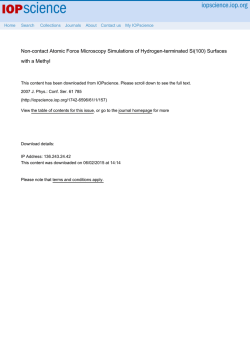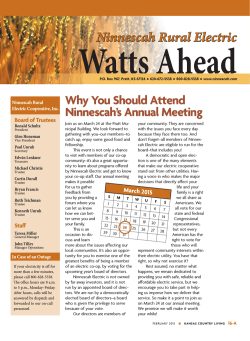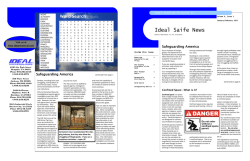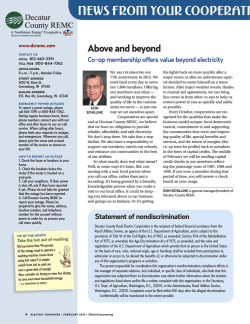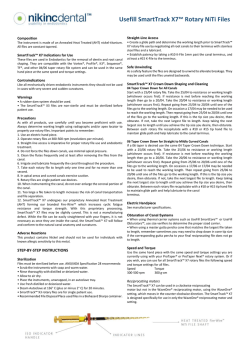
Febr. Newsletter - Cuming County Public Power District
Cuming County Connection February 2015 “To get through the hardest journey we need take only one step at a time, but we must keep on stepping.” That’s wisdom from the ancients. The hard journey I find myself on is the journey that has me, my fellow employees, and the Board of Directors walking through the various rate classes of our customers and trying to determine an equitable and fair method of allocating the recent cost increases incurred by our Power District. As you may have read in the newspaper or heard on the radio, Tuesday December 16, 2014, upon recommendation of Management, the Board of Directors of Cuming County Public Power District (CCPPD) voted in an overall rate increase of 3% effective January 1, 2015. This rate increase is mainly a straight pass through of the 1.8% overall increase in the Transmission rate that CCPPD pays to Nebraska Public Power District (NPPD). The remaining 1.2% will cover the ongoing operations of CCPPD, including maintenance of lines and facilities, service upgrades, and generally working to keep the lights on for our customers. As mentioned, the difficult aspect of any increase in costs for those of us in Public Power is making certain that the customers who “caused” the increase in costs pay for these increased costs. Our priority is to carefully analyze past usage patterns and future load forecasts along with updating our cost of service studies to determine the fairest method of cost allocation. At the end of the day we want each Cuming County Public Power District ~ February 2015 Page 1 customer to understand their bill, what their energy is costing them, and why it costs what it costs. You can be assured CCPPD GM, Chet McWhorter that because one of the core values of CCPPD is Accountability, we, the board and employees of CCPPD, make every attempt to take ownership, be decisive, and move forward. While no one likes the idea of an increase in costs, CCPPD would rather be upfront on the issues and continue moving forward as a provider of choice. We endeavor to provide a service that our customers view as valuable and to serve our customers with integrity, common sense and an understanding of the impact that our decisions have on your everyday lives. 2015 Power Drive March 28th in West Point Cuming County Fairgrounds Make Efficiency Affordable If you have purchased a new appliance recently, you probably found yourself comparing the annual energy consumption of various models. You probably also noticed that efficiency costs extra. When it comes to appliances, water heaters and HVAC systems, consumers face a classic dilemma: pay now or pay (more) later. The answer is simple: Make efficiency affordable. Energy efficiency is part of Cuming County Public Power District’s DNA. More than 95 percent of electric cooperatives and public power districts nationwide offer efficiency programs. As consumer-owned, notfor-profit utilities, we are constantly looking for ways to keep customers’ bills low, including programs to make high-efficiency appliances and equipment more accessible. Cuming County Public Power District has energy efficient programs available to customers, such as free energy audits. We will come to your home and find ways to save energy which in turn saves you money. We also offer rebates on more energy efficient heat pumps, cooling system tune-ups, attic insulation, LED’s, hog heating mats, irrigation pumps, VFD’s, commercial HVAC systems, and commercial and industrial lighting. For more information, please call CCPPD at 402-372-2463. Working together at the national level, electric co-op’s and PPD’s advocate federal policies and programs that can reduce the up-front cost of energy February Calendar efficiency. Co-ops are now partnering with the U.S. Department of Agriculture, for example, on a new low-interest loan program targeted to rural customers. At CCPPD, we want our customers to be armed with the information they need to make cost-effective investments in efficiency. Good information will lead to smart choices not only about appliances but about efficiency upgrades. A good place to start is online at www.energy.gov, for tips and tools on how to save. What qualifies as a smart efficiency investment will differ from member to member, of course. Many factors will determine whether you should put your money into insulation, replacing your water heater or purchasing an ENERGY STAR-qualified appliance. There might be rebates and incentives that can help offset the cost of upgrades. We understand there is no such thing as a one-size-fits-all efficiency solution. Our staff can help you sort out which energy efficiency investments make sense for you and your situation. Contact us at 402-3722463. CCPPD strives to be a trusted energy partner for every single one of our customers. So come talk to us about how we can help save you money! February 14th ~ Happy Valentine’s Day! Cuming County Public Power District ~ February 2015 Page 2 Here’s a money-saving trick: Take care of Yourself By: Lisa Hughes-Daniel You may be paying off debt, following a budget and saving money for retirement - all are important for keeping a sound nancial plan. You may, however, not be thinking about another factor that can have a signicant impact on your lifelong nances: your health. The simple fact is chronic health problems are often expensive. Consider a few statistics: * People with diagnosed diabetes have an average of $6,649 in medical costs per year that are attributed to the disease - about 2.3 times more than they would incur without diabetes. * Smoking, the leading cause of preventable death and disease, costs men an average of $20,893 more in medical costs and women an average of $23,142 more. * Obese Americans spend 36 percent more on health care and 77 percent more on medication than those who weigh less. * Heart attacks and stroke cost the U.S. more than $312 billion a year in medical expenses and lost productivity, with individuals paying in the form of medical bills and lost wages. While some health issues you may face during your lifetime are beyond your control, the conditions above are often linked with lifestyle choices, such as poor diet and lack of exercise. Two-thirds of American adults today are either overweight or obese, which increases the risk of developing heart disease, stroke, diabetes and many types of cancer. These are serious conditions that require ongoing medical care and medications. Healthy habits for life There are things you can do to improve your long-term health and quality of life - and keep lifetime medical costs to a minimum: * Get regular exercise. Even a 30-minute brisk walk ve times a week can improve heart health, lower blood pressure and cholesterol and help prevent or manage type 2 diabetes. * Don’t smoke. If you do, get help Page 3 Cuming County Public Power District ~ February 2015 quitting. Smoking is one of the single worst things you can do for your health; it contributes to heart disease, stroke and many kinds of cancer. * Maintain a healthy weight. Being overweight is a risk factor for many chronic, debilitating illnesses. If you need to lose weight, talk with your doctor about creating an exercise and food plan. * Eat smart. If your usual diet is high in fat, sugar and sodium, it may be time to make changes. Pay attention to portion sizes, especially when eating out. * Get regular checkups. Routine medial care, screenings and immunizations can help you stay ahead of any developing health problems and get the treatment you need to stay healthy. Remember, you’ll work hard to build your retirement savings during your career. When the time comes, you’ll want to spend that money on things you enjoy; travel, hobbies, family and living comfortably. So make every effort now to invest in your health, and you’ll be in better physical shape to enjoy your retirement, too. Sources: Center for Disease Control and Prevention (CDC), 2014 Notes. Rand Corporation. Employee Benets Research Institute, 2013 Notes. Lisa Hughes-Daniel is a marketing communications consultant who writes and edits employee benets-related materials for the Insurance & Financial Services Department of the National Rural Electric Cooperative Association, the Arlington, Va.-based service arm of the nation’s 900-plus consumer-owned, not-for-prot electric cooperatives. Locate Air Leaks with a Buck Take a walk around the outside of your home to check for air leaks in weather stripping around exterior doors. Close each door on a dollar bill or a strip of paper in several locations around its perimeters. If you easily can remove the bill (or it falls out), the weather stripping needs to be repaired or replaced. Also perform a visual check of every weather strip, looking for cracked, deformed or missing sections. Most types of weather stripping are fairly inexpensive, so if you find a damaged area, replace the entire side instead of just trying to splice in a short section. Tip #1: The manufacturers of most insulated and highquality wood exterior doors offer replacement weather stripping kits that are precut to fit the door frame. Tip #2: If you need to buy bulk weather stripping , calculate the amount you’ll need by measuring the top and both sides - and then add 5 to 10 percent for waste. Tip #3: Remember to check the fit of the threshold at the bottom of every door too, and adjust it or replace it if necessary. Tip #4: From inside your home, you can use the same dollar-bill technique to test for leaks around the weather stripping on operable windows. Tip of the Month Did you know that 90 percent of the energy used to operate a washing machine comes from using hot water? A simple switch from hot to cold can save a great deal of energy! Also, consider air drying or even line drying to save even more household energy. MANAGEMENT Chet McWhorter ................ General Manager Kari Haase ........................... Chief Financial Officer OFFICE SERVICES Donna Feldhaus ................. CSR 1 Sheena Kampschneider ..... CSR 1 Nicki White ......................... CSR 2 Mary Troyer ........................ Accountant OPERATIONS Scott Haber ......................... Working Foreman Jim Yosten ........................... Working Foreman Willy Anderson .................. Journeyman Lineman Scott Case ............................ Journeyman Lineman Gene Cihacek ...................... Journeyman Lineman Jess Hunke ........................... Journeyman Lineman Brian Throener ................... Journeyman Lineman Tristan Bettenhausen ........... Part Time Intern Tisha Alfson ........................ Operations Services Supv Sarah McGill ....................... Dispatcher/Mapping Tech Monte Draper ..................... Technology Supervisor BOARD MEETINGS Regular meetings of the CCPPD Board are normally held on the second Wednesday of each month at the office. Notice of times and date changes are published monthly. BOARD OF DIRECTORS Leroy Mostek, President ..... 402-528-3872 Danny Kluthe, Vice Pres.... 402-693-2833 Rollin Bremerman, Sec ...... 402-528-3521 Ed Kaup, Treasurer ............. 402-372-2966 Dennis Weiler ...................... 402-372-2713 Greg Strehle .......................... 402-372-5065 CONTACT US: PO Box 256/500 S. Main • West Point, NE 68788 402-372-2463 or toll free 877-572-2463 24-hour answering service E-mail: [email protected] Source: U. S. Department of Energy Online: www.ccppd.com Office hours Cuming County Public Power District ~ February 2015 Page 4 Monday-Friday 7:30am-4:00pm
© Copyright 2026
